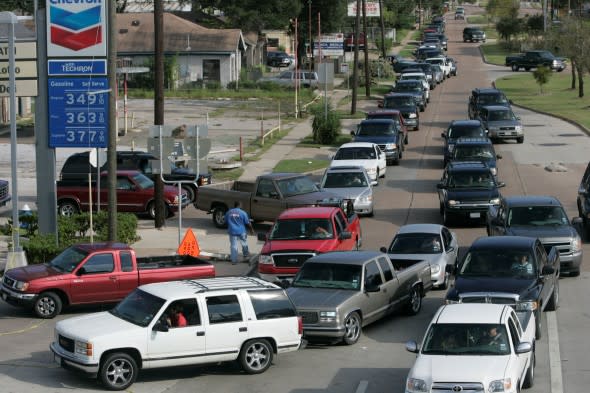The history of price gouging amid US disasters and how different states fight against it
Reports of price gouging have become as frequent as the storms they accompany. Stories emerge as businesses hike up the prices of products that victims desperately need. For years, residents' wallets have been hit hard from airlines, grocery stores, convenience shops, gas stations and other businesses in the wake of natural disasters.
While the increased prices are almost always accompanied by backlash against those companies, it hasn't stopped the issue from resurfacing every year.
At the cross-section of this debate is the conflict of economics and ethics. The economic argument is that when demand for products skyrockets (like after a disaster) and the supply is stagnant, then prices should rise in order to boost profits.

Motorists line up to get gas in the aftermath of Hurricane Ike in Houston, Monday, Sept. 15, 2008. (AP Photo/Marcio Jose Sanchez)
But ethically, those price hikes have always been met with scorn. For victims of natural disasters, those products are often essential for survival. Critics of price gouging argue that storm victims shouldn't be penalized for their location of residency.
Some of the most rampant examples of price gouging came during the most destructive storms in recent years, such as Hurricane Katrina, Hurricane Sandy, Hurricane Harvey and Hurricane Irma.
In the wake of Katrina, the consumer protection division of Mississippi fielded nearly 1,400 complaints per day. Countless contractors scammed victims by promising to repair homes then never returning after taking the deposit. A hotel manager was sentenced to five years in prison for boosting prices.
In Louisiana, the office of the Attorney General fielded hundreds of reports from renters complaining about heightened rents following the storm, as some landlords were reportedly trying to use the storm as an excuse to evict poorer tenants.
After Sandy, 185 residents received over $282,000 in reimbursements from hotels, gas stations and hardware stores for price gouging.
In a release after the fines were delivered, Eric Kanefsky, director of the state division of consumer affairs in New Jersey, said "there is no excuse or justification for gouging consumers during a declared state of emergency."
But despite those examples, price gouging claims only increased after Harvey and Irma. Reports of $20 per gallon of gas and $99 cases of water were cited in Texas, despite Attorney General Ken Paxton's warnings. Numerous hotels were cited as well, some of which tripled their nightly costs. In the end, 48 businesses paid over $166,000 in civil restitution to Texas residents.
In Puerto Rico, the reports were even more rampant. Cases of water were again selling for $99 while other reports highlighted $3,200 plane tickets. Nearly 8,000 complaints were made following Irma.
Claims of price gouging have followed into 2018, most notably in Hawaii with Hurricane Lane. As some residents and tourists were looking to escape the storm with a flight to California, Delta Airlines faced backlash after a picture was posted on Twitter depicting tickets selling for exponentially more than usual.
